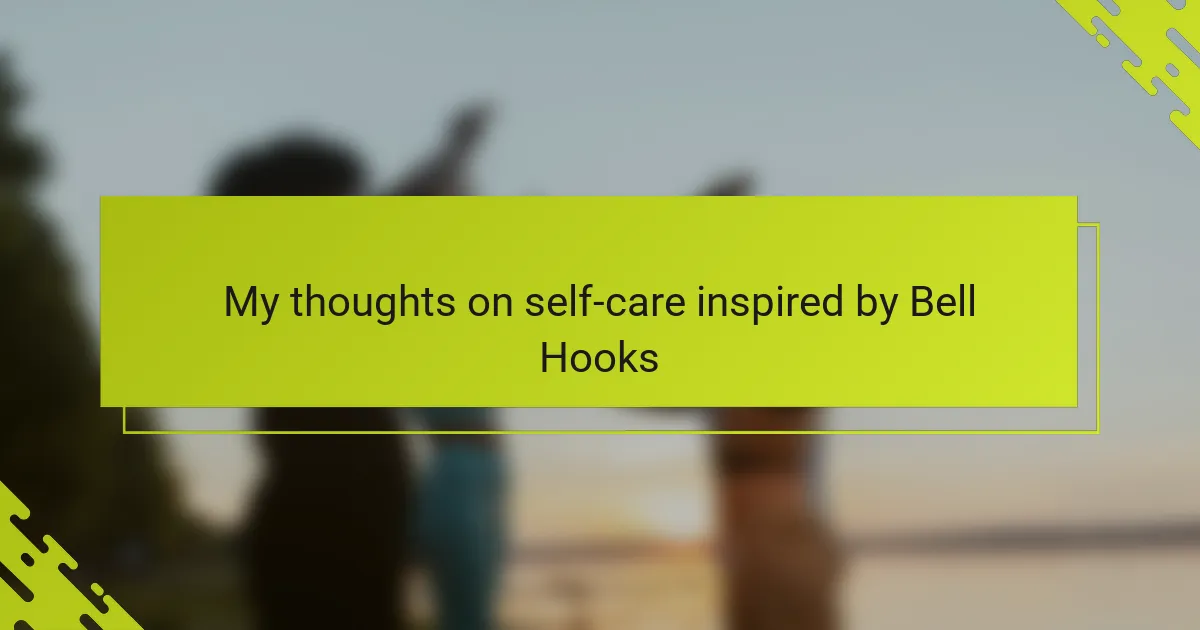Key takeaways
- Self-care encompasses a holistic approach to nurturing mind, body, and spirit, requiring personal reflection and authenticity.
- Bell Hooks frames self-care as a political act tied to love and community healing, emphasizing its collective impact.
- Queer women often face unique challenges in practicing self-care, necessitating the creation of supportive environments that honor their identities.
- Building self-care communities fosters connection and understanding, transforming individual practices into communal acts of resilience and empowerment.
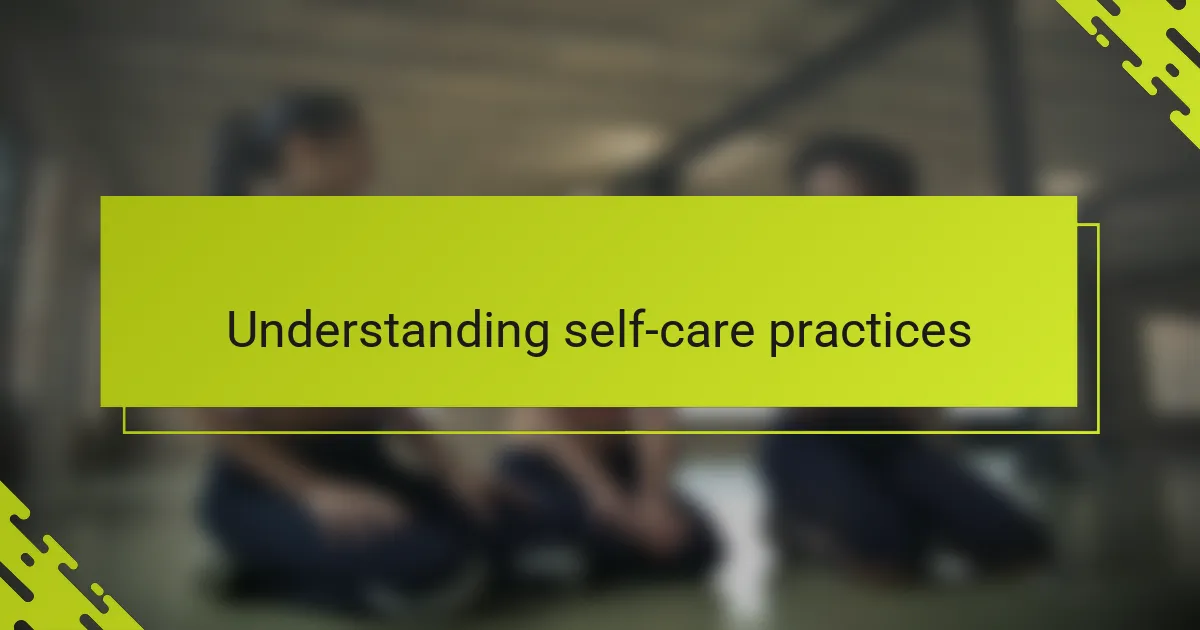
Understanding self-care practices
Understanding self-care practices means recognizing that self-care is more than bubble baths or occasional treats; it’s about nurturing our whole selves—mind, body, and spirit—in ways that feel authentic. I’ve learned that when I pause to listen to what my needs truly are, rather than what society expects, my self-care becomes a form of resistance and healing.
Have you ever noticed how easy it is to overlook the small, daily rituals that rebuild your energy? For me, it’s in those quiet moments of reflection or relishing a book that feels like a friend; these pieces add up to a profound sense of well-being. Self-care, in this sense, is deeply personal and must be honored as such.
Bell Hooks teaches us that self-care is tied to love and justice, which made me rethink how my routines impact not just myself but the communities I am part of. How can a practice that feels so intimate also be an act of political defiance? Understanding this complexity reshaped the way I approach caring for myself and others.
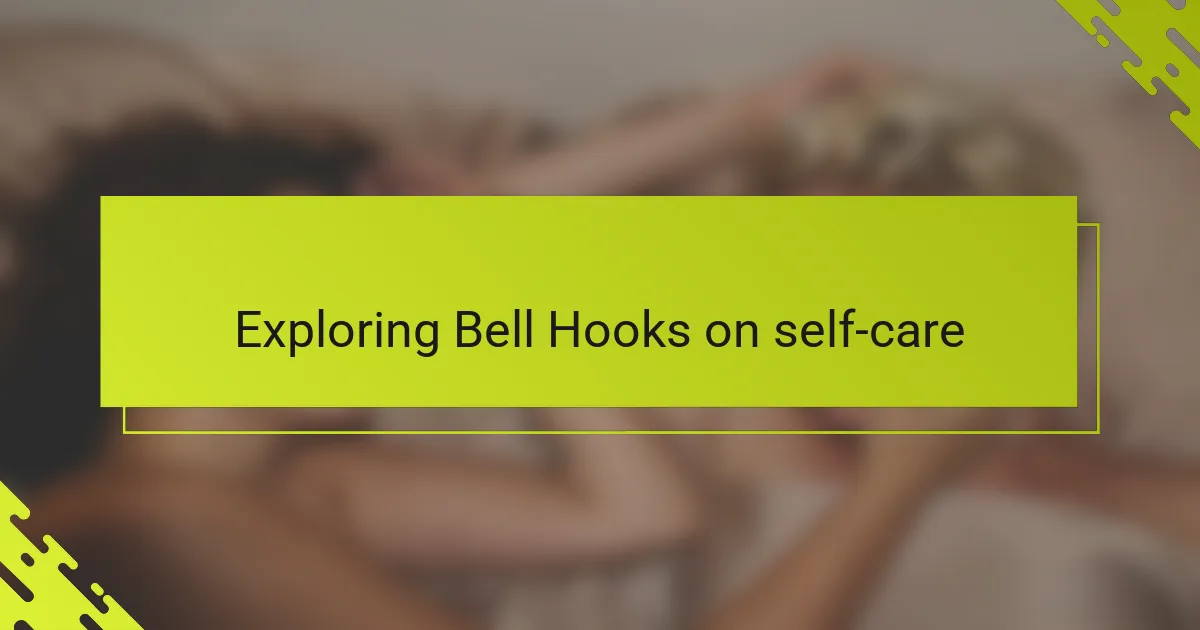
Exploring Bell Hooks on self-care
Bell Hooks challenges the common notion of self-care by framing it as a political act rooted in love and resistance. When I first read her work, it struck me how caring for myself isn’t just about comfort—it’s a bold statement against systems that seek to wear me down. Have you ever felt that your need for rest or joy was somehow a radical refusal to be erased?
What resonated deeply with me is how Hooks connects self-care to community healing. I began to see my own practices not as isolated moments but as contributions to collective survival. It made me ask: how can my personal acts of care ripple out and support others who face similar struggles?
Reflecting on Hooks’ perspective, I realized self-care demands vulnerability and honesty with myself. It’s not always easy to lean into what truly nourishes me when external pressures try to dictate otherwise. But embracing self-care as an act of love felt empowering—it became a way to reclaim my power and nurture my soul on my own terms.
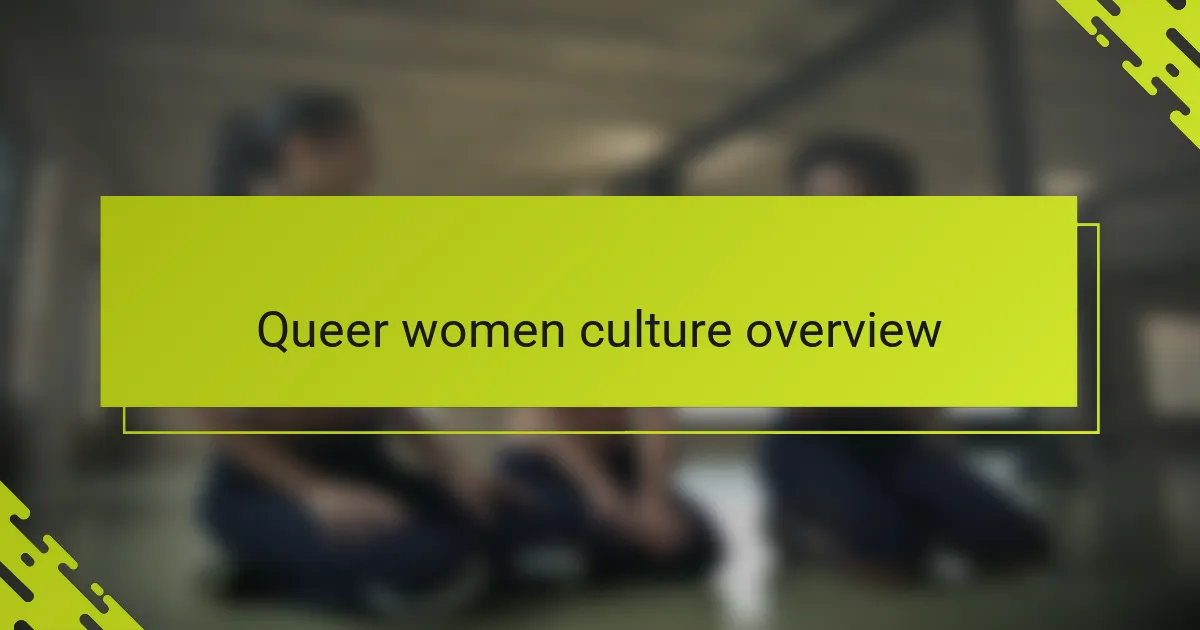
Queer women culture overview
Queer women culture has always been a vibrant tapestry of resilience, creativity, and radical love. From my experience, it’s a space where identities intersect and evolve, offering not just visibility but a sanctuary for authentic self-expression. Have you ever felt the power that comes from simply being seen and celebrated for who you truly are?
What strikes me most about queer women culture is its deep commitment to community and mutual care. It’s not just about individual journeys but about weaving those stories together to form a collective strength. In gatherings, conversations, or even shared silences, I’ve witnessed how this culture nurtures both healing and activism.
This culture also challenges mainstream narratives around gender and relationships, inviting us to rethink norms and embrace fluidity. I often find that queer women spaces encourage me to explore self-care beyond surface-level clichés—inviting radical self-acceptance that feels both personal and political. How do you see your own culture shaping the way you care for yourself?
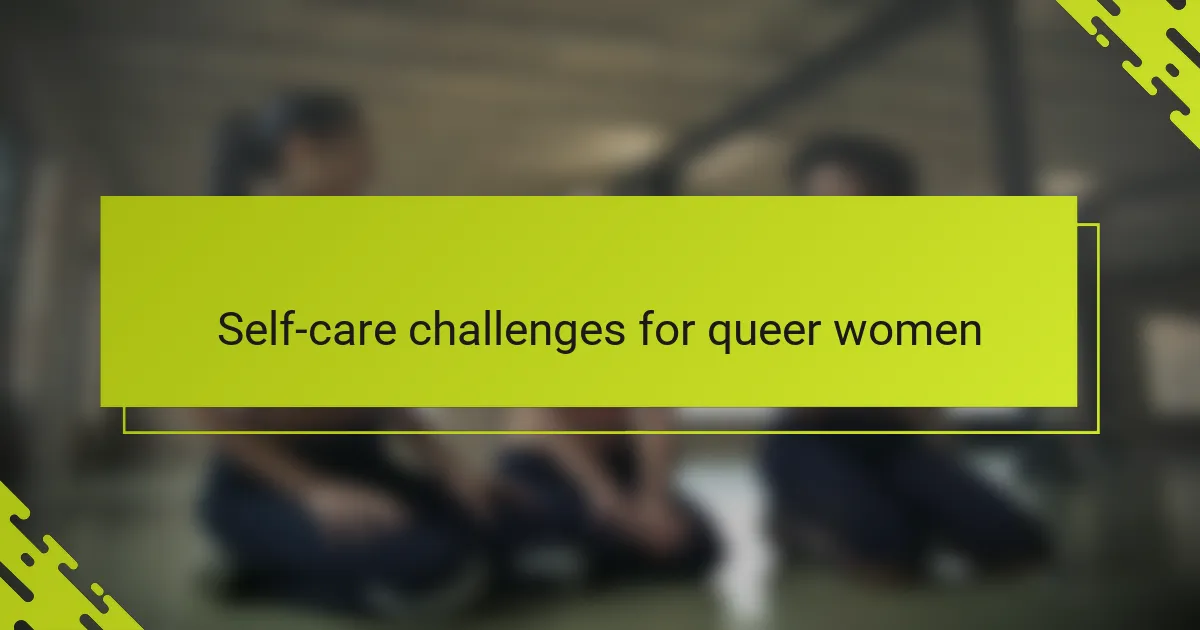
Self-care challenges for queer women
Navigating self-care as a queer woman often means confronting layers of marginalization that can make rest feel both urgent and elusive. I’ve noticed that the pressure to constantly prove my worth—whether in work, relationships, or community—can turn self-care into another task, rather than a refuge. Have you ever felt guilty for needing more space and time just to breathe, as if your rest should be earned?
There’s also the challenge of finding self-care practices that genuinely resonate when mainstream culture’s offerings don’t reflect our realities. For me, traditional ideas like “treat yourself” often miss the mark, because healing requires more than indulgence; it calls for safe spaces where queerness and self-love are honored without compromise. What forms of care have you discovered that truly speak to your experience?
Sometimes, the hardest part is resisting the isolation that stigma and invisibility can impose. I’ve learned that leaning into community, sharing struggles and joys, transforms self-care from a solo act into a radical collective support. Could reclaiming care together be the key to breaking down those barriers we face?
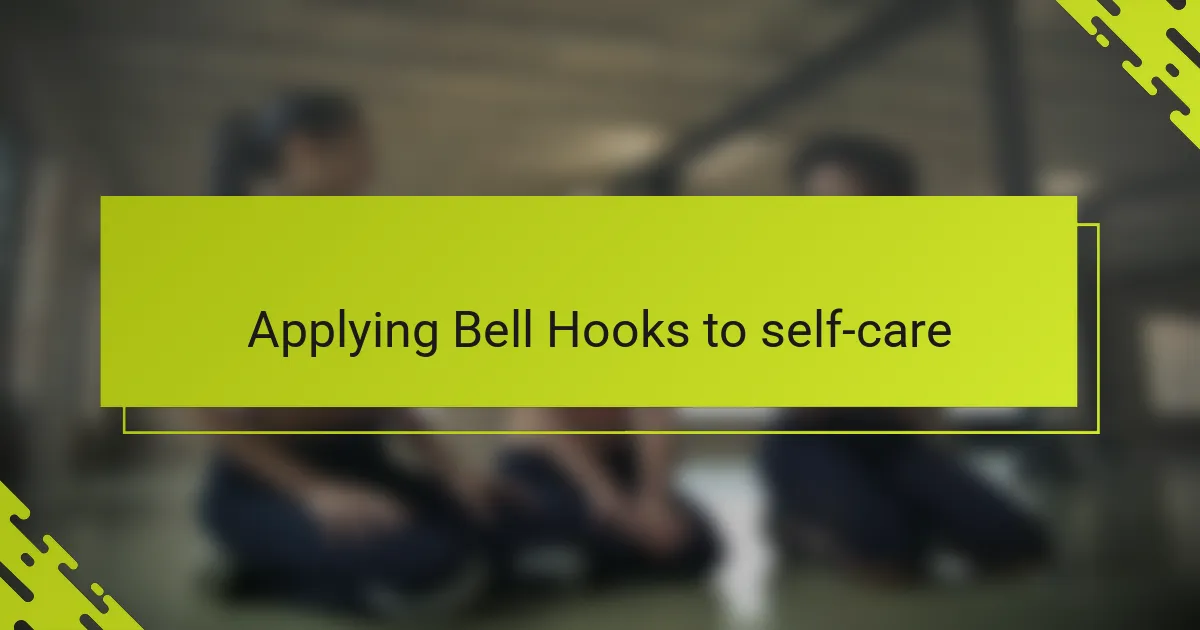
Applying Bell Hooks to self-care
When I apply Bell Hooks’ framework to my self-care, I start by asking: how am I loving myself in a way that resists the world’s attempts to diminish me? For me, this means setting boundaries that protect my energy—not out of selfishness, but as a radical act of self-preservation and political defiance. Have you ever felt that saying “no” is actually a loud “yes” to your own worth?
Hooks also taught me to view self-care as inherently linked to justice, which reshaped how I care within my community. Sometimes that looks like showing up vulnerably for a friend or creating spaces where queer women can feel safe, knowing that these acts nurture not only individuals but our collective survival. Isn’t it powerful to realize that caring for yourself can be a tangible step toward healing the world?
I’ve found that embracing Hooks’ vision means holding self-care with both tenderness and intentionality. It’s more than fleeting comfort—it’s about sustaining a deeper resistance against systems that try to erase us. When I take time just for me, I’m not retreating—I’m fueling a long, necessary fight for healing and liberation. How do you hold your self-care as a form of resilience?
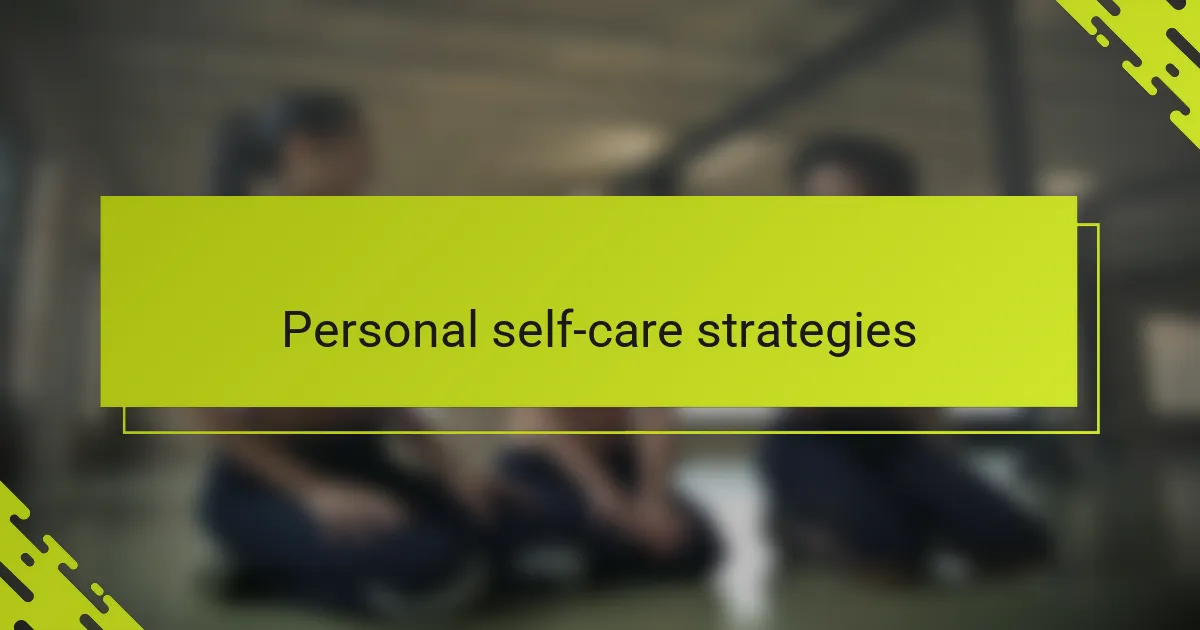
Personal self-care strategies
For me, personal self-care strategies often start with recognizing what truly replenishes my spirit, even on the busiest days. Sometimes that means stepping back from social media to protect my mental space, other times it’s simply allowing myself to pause and breathe deeply without guilt. Have you noticed how such small shifts can quietly transform your energy?
In practicing these strategies, I’ve found that routine alone isn’t enough—there has to be intention behind every choice. When I deliberately choose activities that align with my values and emotional needs, like journaling about my experiences as a queer woman or creating art that expresses my struggles, self-care becomes a way to honor my authentic self rather than just a checklist. What personal rituals have you found that speak to who you really are?
I still struggle sometimes with feeling selfish for prioritizing my well-being, especially when community demands feel pressing. But I’ve learned from experience that setting boundaries and saying no is not abandonment—it’s a necessary way to preserve my capacity to show up fully for both myself and those I love. How do you balance your needs with the expectations around you?
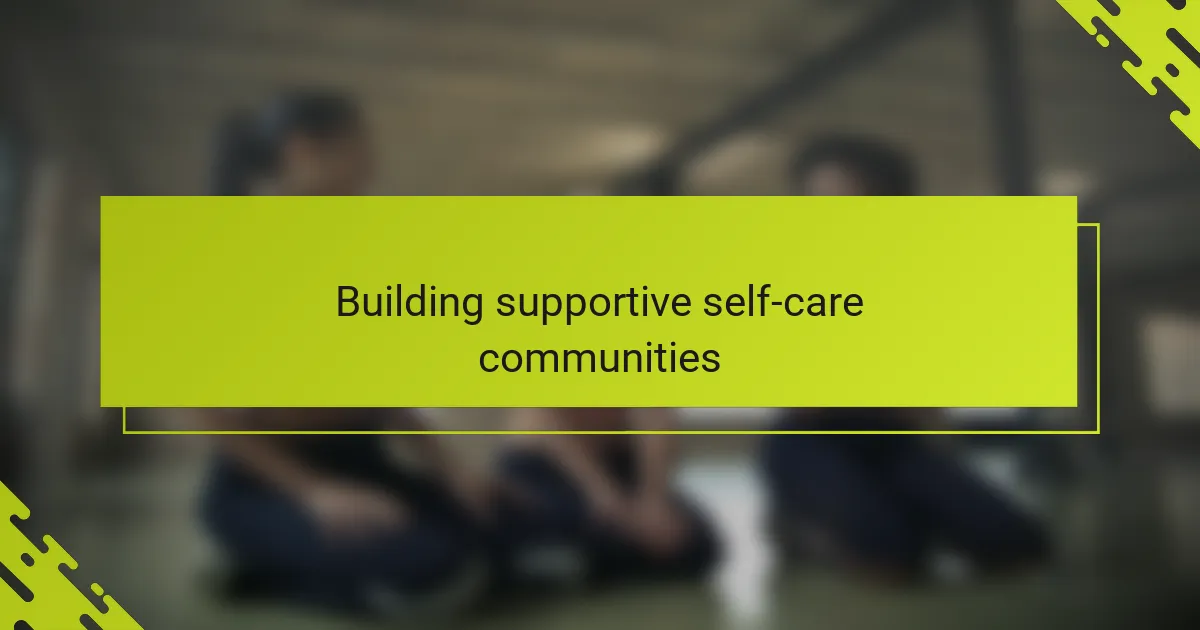
Building supportive self-care communities
Building supportive self-care communities feels to me like creating a collective sanctuary, where vulnerability is met with understanding rather than judgment. I remember a time when sharing my struggles around exhaustion with a small group led to an unexpected sense of relief—we weren’t just individuals coping alone but a web of care lifting each other up. Doesn’t that shift from isolation to connection make all the difference?
I find that these communities thrive on trust and openness, where showing up without masks allows for genuine support to flourish. Have you ever experienced how simply being heard by people who truly get your experience can transform your relationship with self-care? It’s in these shared spaces that self-care moves beyond the personal and becomes a radical, communal act of resistance against loneliness and invisibility.
What’s powerful about building supportive self-care communities is how they reflect Bell Hooks’ idea that love and justice go hand in hand. When we nurture each other authentically, we’re not just surviving—we’re actively reclaiming space for healing and resilience. How might your own self-care deepen if it were sustained within a community that honors your fullest self?
